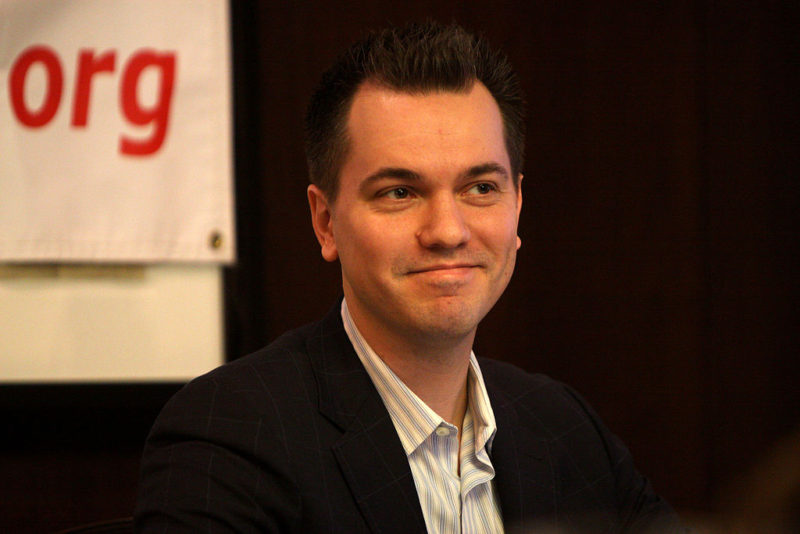By Brian Robbins, Clayton Times
As the United States Senate election in Missouri heats up, we had the chance to talk to one of the candidates running in next year’s election.
Austin Petersen, a former Libertarian presidential candidate, is attempting to grab the Republican nomination for the U.S. Senate seat that’s now held by Democratic Sen. Claire McCaskill.
We asked Petersen what would separate him from the rest of the candidates. How will he merge his Libertarian values while also appealing to more moderate voters in Missouri?
Clayton Times: In your opinion, why do you feel like you’re the right candidate to represent Missouri?
Petersen: I think I can appeal not just to Republicans but I feel like I can appeal to Independents. I have a third-party background and I actually think I’m going to get a lot of support from Democrats as well because with Sen. Claire McCaskill being very moderate [it] doesn’t speak to some of the issues that her base really cares about and being a Libertarian as I am, a different kind of Republican, I think that’s going to make me competitive in some of the blue districts – where historically traditional Republicans have had a difficult time penetrating.
Clayton Times: In your opinion, what are some shortcomings of incumbent Sen. Claire McCaskill?
Petersen: I think she’s out of step with Missouri voters, especially in the issue of Neil Gorsuch. It’s kind of interesting because I think that some leaked audio came out that showed that she actually wanted to vote for him but the fact that her base did not want her to. It shows that when she ultimately filibustered to stop him, that she was not doing what she thought was right but what she thought the far-left of her Democratic base wanted. We elect senators for good judgment, I think that she expressed poor judgment in that situation. [She] was the first person to endorse Hillary Clinton way back in 2013 I think on Capitol Hill [which] was a big mistake [and] out of step with Missouri voters. [Clinton] lost by 19 points I think in the state. Also, on the issue of criminal justice reform, that’s a big issue to me. That’s something that I think she’s out of step of her own base on and that’s something that I think Missouri will be able to get cross-over votes on. I think the federal war on drugs has gone way too far penetrating into many of our urban areas and hollowing them out and I think that’s an issue [where] I’ll be able to get those cross-over votes on.
Clayton Times: What’s the biggest challenge in running for U.S. Senate when compared to the presidential race?
Petersen: It’s a lot better than having to drive 13 hours or having flights from Portland to Maine and Boston to Las Vegas for debates and things like that. There’s a lot of pressure when you’re running for President of the United States of course because you have to worry about pleasing a 50 state constituency rather than just your own home state. The challenges here are that in our state you have conservatism in both parties, which can be a really good thing for a Republican because even Democrats tend to be pro-life and pro-gun here. Being able to message for a Missouri audience is much different [than] a presidential campaign. The challenge I think is just how to construct and craft a winning message, especially because yes, you have to win a primary but you also have to win a general election too. That’s honestly why I think I’ll be competitive because the type of values that I embody are uniquely Missouri values.
Clayton Times: Are you going to incorporate some of your Libertarian principles into your run as a Republican, or will you change some of your stances to appeal to more moderate voters?
Petersen: Nothing is changing. In my heart I’m running as exactly who I am. You don’t earn voters’ trust by changing who you are just to get elected. At the end of the day, if you change who you are just to get elected and you lose, you lose twice. I may not have won the presidency obviously but I won a lot of hearts and minds and at the end of the day if Missouri chooses not to make me their next senator I think I’m going to bring a lot of positive impact in this race by bringing up some issues [that] may not have been brought up. I will hold Republicans to their principles and I will challenge Democrats on their vision for the United States which I think at the moment is not selling well, it’s a bad brand. The leaders of the Democratic party are all in their seventies and they need some fresh blood. I just saw a poll yesterday that showed that millennials are not tied to the Democratic Party so I think there’s opportunity there.
Clayton Times: How do predict that Republican voters will react if you aren’t willing to change some of your stances?
Petersen: I hope positively because the funny thing is that we haven’t been getting a lot of push-back. I’ve been going to some Republican county meetings and sure there’s still some of the social issues that tend to be [a sticking point] but I believe for the most part they enjoy seeing young people run for office. They’re tired of the same old faces, people who have been in office way too long. While I may be a young person, I’m campaigning on the same old ideas, the Constitution – limited government and liberty. Honestly, if you claim to believe in the constitution then Libertarian values are very much embodied in that.
Clayton Times: What’s the best balance in appealing to core Libertarians but also getting that Republican or even Democratic vote?
Petersen: There is a bit of a challenge when you’re speaking to different audiences – you want to talk about issues that they care about. I think most importantly, you really need to be a good listener. A lot of times the problem with politicians is that they’re going to go out there and tell people how it’s going to be but the way not to alienate them, and not to alienate your Libertarian base is first ask people what issues they care about. The things that I’m hearing out there so far [is] healthcare number one, number two jobs, number three taxes, after that they are worried about things like prescription drug problems. A lot of times the voters will support a candidate that they don’t agree with a 100 percent of the time, that happens a lot. Sometimes you can’t win them all, because if you try and please everybody you end up pleasing nobody. So you have to stick with what you believe in but at the end of the day I think voters really want somebody that will listen to them.











